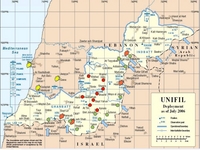|
Southern Lebanon. Green indicates Israeli occupied town; red IDF warned towns of operations. Click map to view. |
After the airstrike in the Lebanese town of Qana, which killed 57 civilians, Israel has enforced a unilateral 48 hour cessation of air strikes against targets in Lebanon. A new report indicates 28 more civilians were killed during Israeli air strikes against Hezbollah positions in villages in southern Lebanon. The fact that Hezbollah is firing from civilian centers to provoke an Israeli response is generally ignored by the media and international community, and subsequently the tide of international pubic opinion has turned against Israel.
From the beginning of this conflict the Israeli leadership lacked a coherent plan to effectively strike back at Hezbollah, and because of this they have lost the initiative. Remember that the Israeli plan to degrade Hezbollah is predicated on creating a 2 kilometer buffer zone while conducting air strikes against Hezbollah command and control centers, as well as rocket launch sites and other infrastructure.
The cessation of air strikes is a tacit admission of failure of this policy, as the propaganda results of civilian casualties far outweighs any possible military gain. Israel, while well capable of defeating Hezbollah militarily, has chosen a strategy that will isolate it politically and provide Hezbollah with its own political victory. The air strikes will eventually kill large numbers of civilians (bloodless air wars are a myth) and the Israelis, by appearing unwilling to confront Hezbollah’s army on the ground, makes them appear soft. Every day Hezbollah stands up the the most powerful army in the Middle East is a victory for Hezbollah.
On Saturday, the Israeli Defense Force withdrew from the town of Bint Jubayl, with the reasoning that the IDF never intended to occupy the land. Hezbollah is championing this as a victory for their forces. The Israeli leadership is blind to the political and propaganda ramifications of leaving Bint Jubayl.
The withdrawal follows Hezbollah’s launch of a Fajr-5 rocket at the town of Afula, the deepest into Israeli territory. The Fajr-5 has a range of up to 45 miles. Israeli officials claim to have destroyed “an estimated two thirds of Hizbollah’s long-range missile capabilities” including “Iranian-supplied Zelzal-2 missiles” which have a range of up to 125 miles. Yet Hezbollah continues to launch rockets into Israeli territory. Israel saw the largest amount of rockets attacks on Sunday, almost 150 landed inside Israeli territory.
Despite the cessation of the air strikes (except for close air support operations) the IDF continues to conduct limited operations along the Lebanese border. Defense Minister Amir Peretz claims the ground offensive will be expanded, and his speech was “widely echoed by MKs across the spectrum.” Clashes have been reported in the town of al-Taibeh (Al Tayyabah on the map.) Al Tayyabah is a few kilometers from the Litani River, and a push further by the IDF along with a blocking force on the Litani River could seal the center and western portion of the Lebanese border from Syrian resupply and trap a significant portion of Hezbollah’s southern army. But the Israelis have signaled they are unwilling to go this far at this time. Ynet News also reports “the Paratroopers Division is simultaneously operating in the western region, around villages containing Hizbullah infrastructures.”
Israel’s unwillingness to pay the price in casualties and enter southern Lebanon and the Bekaa Valley in force may prove to be a strategic defeat which it will pay for in the near future. As I stated on Colonel Austin Bay’s blog late last week; “If Israel delays, Hezbollah’s next attack will be far more sophisticated and organized. Hezbollah has transformed from a militia to an organized political and military force in the six short years since the Israeli withdrawal from southern Lebanon. With an emboldened Hezbollah backed by confident Iran and Syria, Israel’s butcher bill will only increase.”
Hezbollah will also increase its power base inside of Lebanon, and directly threaten the Cedar Revolution. Lebanese opposition leader Walid Jumblat gives an inside view of the repercussions Hezbollah’s success against the Israelis:
“We have to acknowledge that they have defeated the Israelis. It’s not a question of gaining one more village or losing one more village. They have defeated the Israelis… But the question now is to whom Nasrallah will offer this victory. Either we will have a state able to establish its control over the country or we will have a state comparable to what is happening in Palestine… a reduced weakened state and a strong militia beside the Lebanese army that decides war and peace at any time and has its schedule decided by the Iranians and the Syrians. I don’t see a state of Lebanon surviving with a militia next to an army. That’s it.”
Time is running out for Israel. At the beginning of this campaign, they needed to strike hard and fast, using ground forces, at Hezbollah’s military assets in southern Lebanon and the Bekaa Valley. They can still do so, but it will come at a far greater political cost.








